'It’s Important That We Stop Confusing Distance With Ability' - Is This Model The Answer To A Fairer Golf Experience?
Meet the women who are on a mission to bring to life their vision that will create a better golf experience for everyone

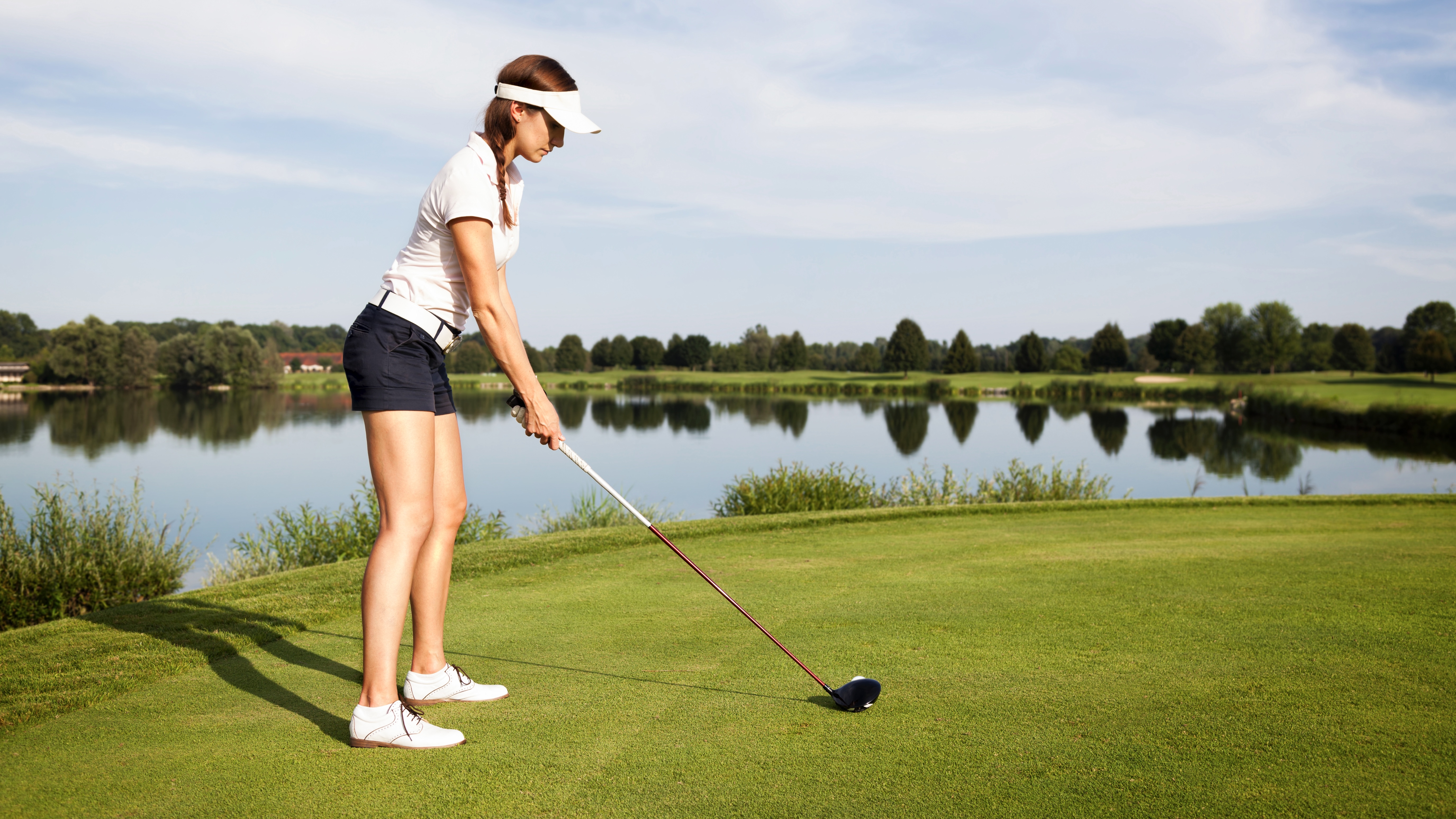
For years now I’ve taught women who are constantly down about their golf games. The round feels like an uphill struggle. They’re maybe a touch gloomy. They want more distance and can’t understand why they are so rubbish at golf.
Women who hit the ball a long way and play off a lower handicap can often be less skilled than those women who take more shots to get to the green and then get up and down. Yet those women who have exquisite short games feel like they are the poorer golfers.
Ladies, you are better than you think you are at this game. Unless you hit the ball 180-210 yards off the tee, you are likely to need some of your handicap shots just to reach the green. The fundamental problem lies in the length of the golf course that you are playing.
For so many women the shortest tees are still too long and often not in a great position. Women are not getting the same experience from the course that the men are. There is a massive imbalance in the length of courses compared to the average distance a woman hits her driver (the WHS defines this as 130 yards carry, 150 yards total)
Encouraged and supported by initiatives at their home clubs, Fiona Womack, member at Bishop's Stortford Golf Club and Sharon Eales from Royal Birkdale Golf Club, have been working hard to raise awareness about the inequitable experience currently offered to shorter hitters and how best to close the gap.

Sharon and Fiona walk the course at Royal Birkdale
Both women have a passion for trying to increase the dismal 15% of golfers who are female. “Golfers live on average 5 years longer, and there is mounting evidence to show that golf delivers a myriad of benefits, which we want to be available to all. We believe that for the sport to thrive it needs to maximise its unique position as a family sport which is played by multiple generations, which means it has to offer an enjoyable and equitable experience for everyone,” says Sharon.
“Fiona found me on Facebook’s Women’s Golf Lounge where I’d replied to something about shorter tees. She was particularly intrigued as I had used mathematical terminology and made the comparison that Dustin Johnson would need to play a course that was 12,000yards long to experience what most women and shorter hitting golfers were experiencing.’
Subscribe to the Golf Monthly newsletter to stay up to date with all the latest tour news, equipment news, reviews, head-to-heads and buyer’s guides from our team of experienced experts.
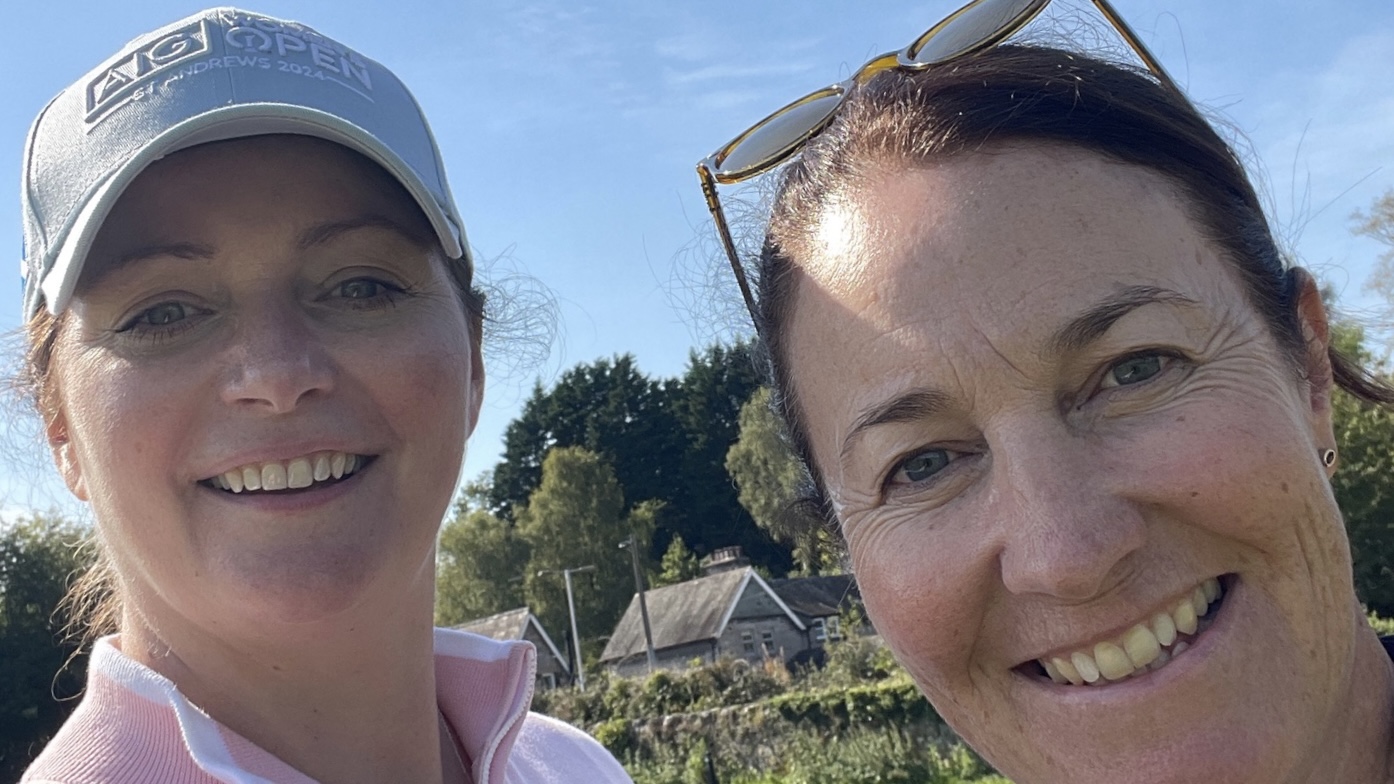
Fiona Womack and Sharon Eales
Sharon and Fiona got together to present their findings, which were the same, but Fiona also considered why golfers don’t seem to like the World Handicap System (WHS), particularly women. From that analysis she concluded that most women were playing courses way too long for enjoyment of the game, and to enable the WHS to work effectively.
Both women have economic backgrounds so they were not phased to deep dive into an analysis of the numbers. Sharon had already used the idea of clubs used in order to have a similar experience, but Fiona took that to a whole new level by creating the model she has today which can be adapted to all sorts of swing speed experiences to suit the golf course requirements..
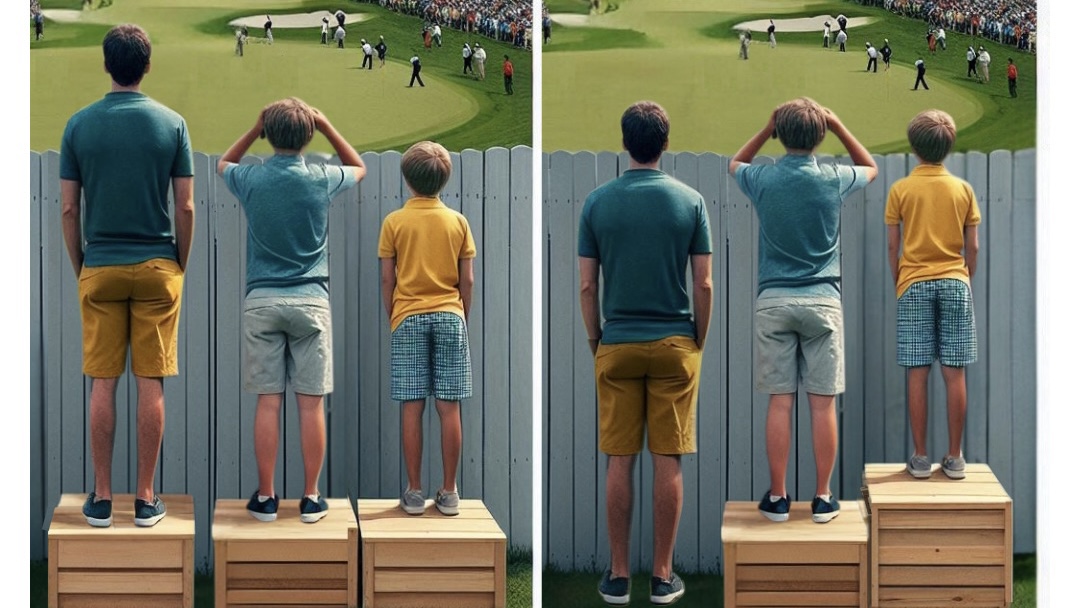
There is often some confusion about equality and equity
There is often some confusion about equality and equity. In the above image, on the left they all have a crate to stand on and that is equality, but the little guy in yellow can't really see. The photo on the right shows equity - with the crates rearranged so everyone has the same experience.
Fiona and Sharon believe that we will have equity in golf course design if all golfers have an ‘Appropriate’ tee to play from, based on recognised principles of golf course design. An ‘appropriate’ tee would provide:
· An enjoyable, fair challenge of golfing skills
· Playing the course as designed with course features, bunkers and penalty areas affecting decisions
· Potential to use all the clubs in the bag
· Reaching the green complex in regulation the majority of the time
Their analysis found that in Great Britain and Ireland ‘appropriate tees’ often do not exist for men and juniors with slower than average swing speeds, or for the majority of female golfers. Golf is one of the very few sports that acknowledges there is a difference in male and female physicality and tees were created for women golfers.
This led to the assumption that those tees were in the right places. However, the analysis shows that most ‘red tees’ are around 1,000 yards too long to give a female bogey golfer the same experience as a male bogey golfer from the ‘yellows’. Which means they are often hitting the ball 50 times just to reach the green complex and 74% of those shots would be with a driver or fairway wood.
The model cleverly illustrates the inequality by showing how long the course would need to be if an average man wanted to experience what an average woman experiences off the reds. For the 10th tee of the New Course at St Andrews, it would need to be 120 yards into the Eden Estuary!
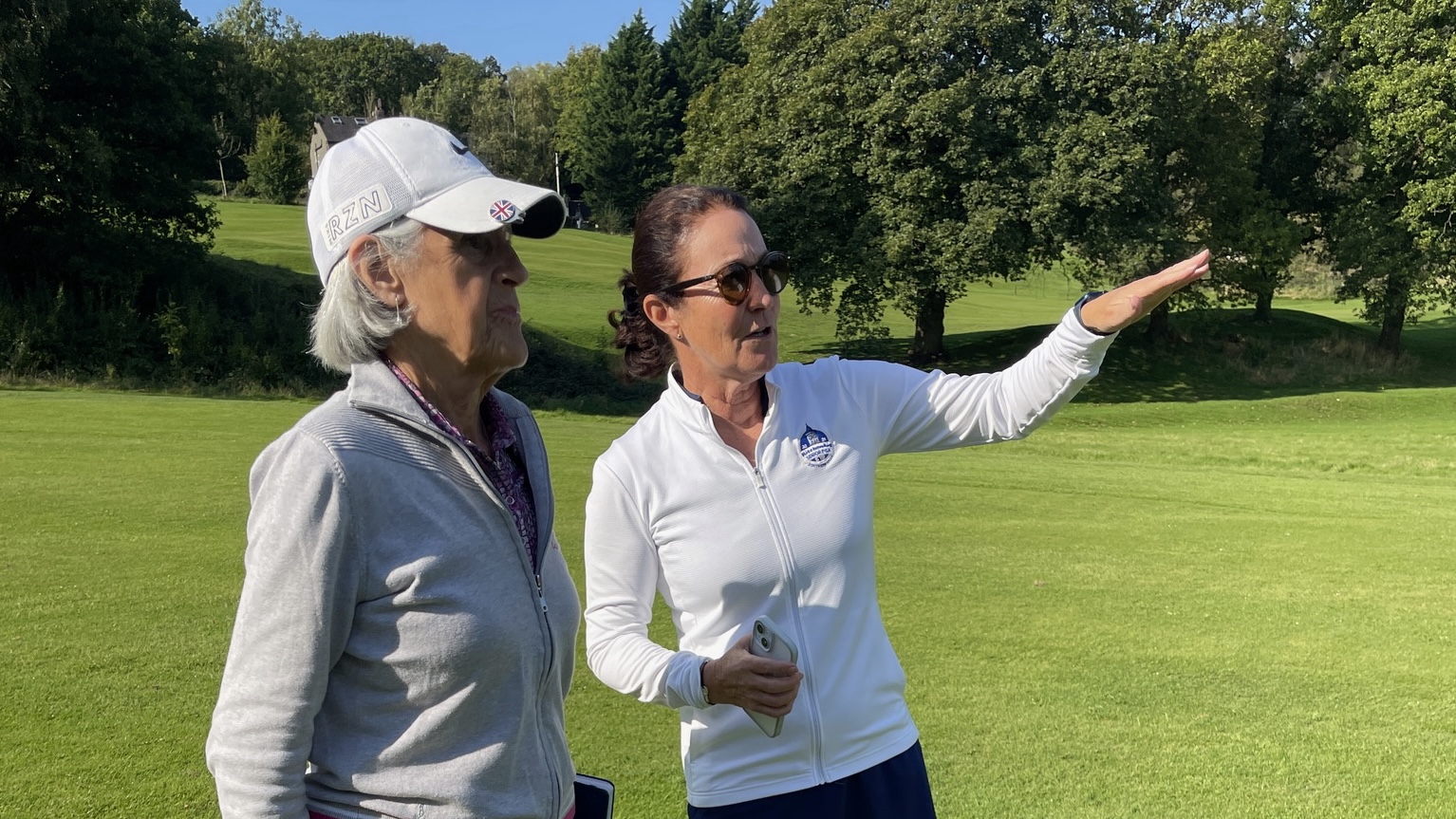
Sharon walks a course giving vision for shorter tee box positions
Many golfers are very resistant to the idea of moving forward, and women even less keen on building new forward tees for them to move to. The terminology used doesn’t help. Telling golfers to play off tees that match their ability rather than their distance implies that shorter hitters are less skilled.
It’s important that we stop confusing distance with ability. Distance is a skill to an extent, but for many people their ability to increase distance is limited by their physicality. No amount of practice is going to make a 70 year-old man hit it as far as he did in his 20s, and often his golfing skill level has not changed. There is no reason we can't offer him a tee box which gives him a challenge similar to the one he had 50 years ago.
There is also the concern that forward tees are dumbed down when in fact playing anything other than an appropriate tee can be playing a dumbed down course. If a course is too short, it can be dominated by distance and the bunkers and penalty areas can be carried and greens reached in less than regulation.
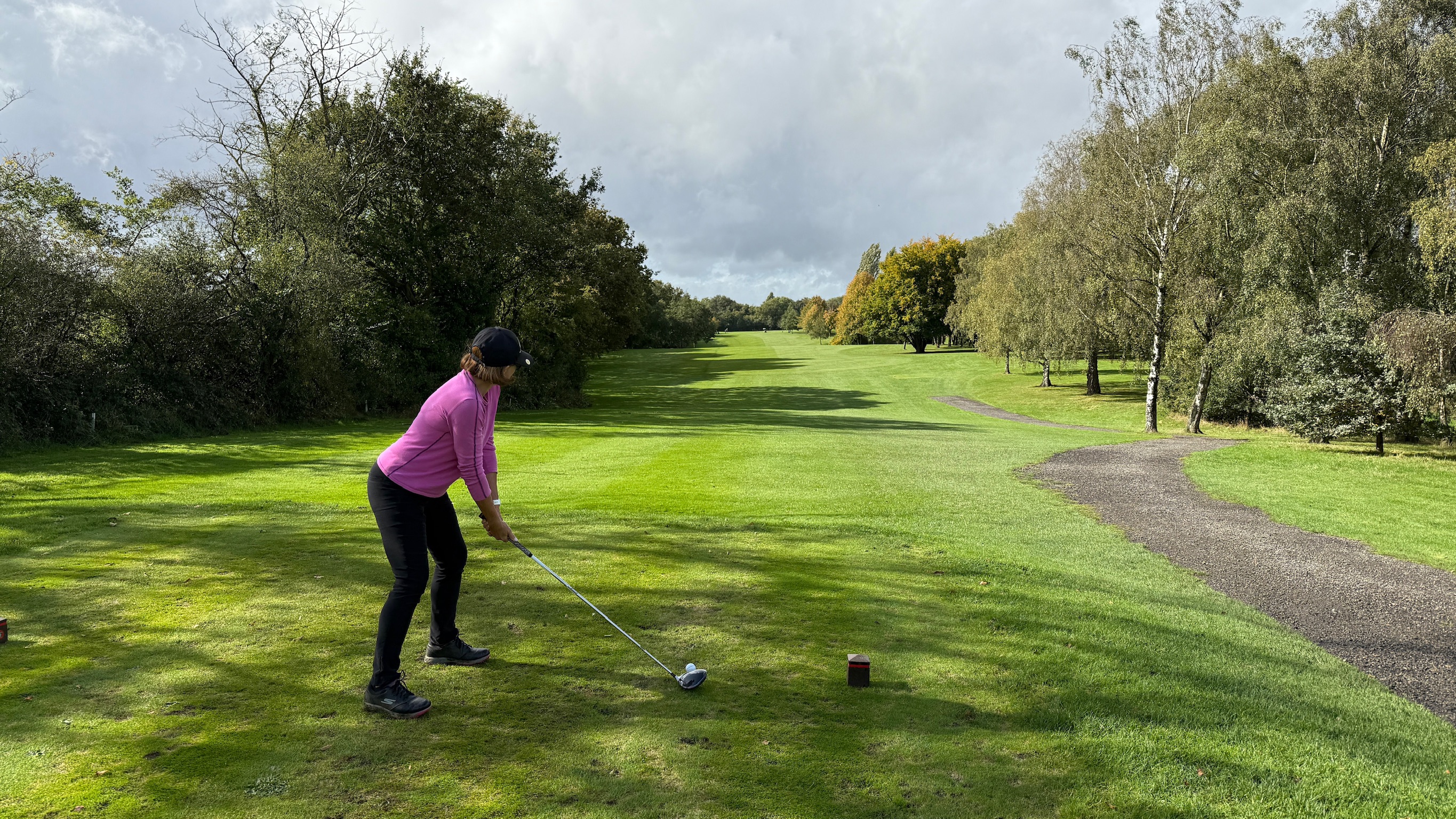
Some holes seem impossibly long for shorter hitters
If a course is too long, it may be much harder, for example, hitting a 3 wood onto a green designed for a wedge, but could also be ‘dumbed down’ if the golfer uses their extra shots to play round the bunkers and hazards and end up with a short chip onto a green designed for a 7-iron.
The idea is not to be prescriptive but to offer golfers options, and ideally a number of tee sets all scaled to provide golfers with a choice. If people enjoy playing from a tee which requires them to hit twenty 3-woods in a round, and they can keep up with the pace of play, then they should have that option, but they should also have the option of playing the course as designed. Many clubs claim their tees are gender neutral, but if all the tees are far too long for an average woman, it’s just a veneer of equality.
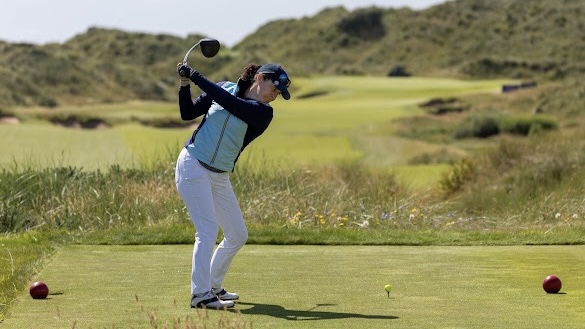
Sharon playing at Trump International Aberdeen on a long par-5
Fast forward two years. Fiona has presented to the R&A’s Handicap Committee, and the WHS Operations Committee and they have been working with Tom Mackenzie from renowned international golf architecture firm Mackenzie & Ebert. Tom Makenzie was already a huge advocate of the need for more forward courses. He often lamented at the poor offering to the shorter hitters on golf courses throughout the world.
The complicated thing is not the maths but in having the analysis, examples and explanations to explain the issue simply and provide a bespoke solution for each club’s needs. Sharon and Fiona have been blown away by the feedback and the support they have received from very well known golf superstars and governing and national bodies. It has been described as ‘a lightbulb moment’, and ‘groundbreaking’.
They were told by a member of the board at England Golf, “‘The amazing thing is how obvious this should have been to everyone in the sport, but we simply never looked for it."
Former PGA Captain Sarah Bennett says, "Having played professionally on numerous tours worldwide, course set-up is vitally important for the competitors and general public, especially within the women's game.
"I have experienced many health setbacks during my career resulting in loss of distance with teeing ground a major contribution. It's vital to play a course which possesses appropriate tees to align with fairway width, landing areas and course design hazards. I certainly don't consider playing from the forward tees an admittance of my ability loss, they are just ideally positioned for me to enjoy a round without loss of the challenge."

Supporters include PGA 2022 Captain Sarah Bennett, along with Fiona and Sharon's partners Darren Womack and Paul Eales.
Interestingly both Sharon and Fiona are long hitters so they aren’t pushing for shorter tees because it would benefit them, but it enables them to see the inequality clearly. Fiona is relatively new to golf and admits she is fairly rubbish, but because courses are so long, she could easily gain a respectable handicap, whilst regularly three putting! “This can’t be right, I play with women who are far more skilled than I am, and are very despondent about their game and their handicap – no wonder we have such an issue with retention,” she says.
Sharon and Fiona have been able to highlight issues that haven’t been obvious before now. “Simplistic logic would say course length doesn't matter, the handicap will adjust to compensate, but back in real life we can prove that whole handicap shots are a very blunt instrument in attempting to level the playing field and it completely ignores the experience of a golfer.”
This isn’t just about sticking discs further down each hole on the fairway in the hope a few beginners or juniors might use them. This is science and creating a properly built tee experience which is a scaled version of the courses that the architect wanted you to play. Incorporating all the same experiences/hazards and really playing golf, just with less yards involved.
What Sharon and Fiona have done and are doing for the women’s game and for golfers who are in their early years playing, as well as in their twilight years, is remarkable and we owe a huge amount to them already. Here’s to more smiley faces after a round in the women’s changing rooms. Golf doesn’t need to feel like an uphill struggle.
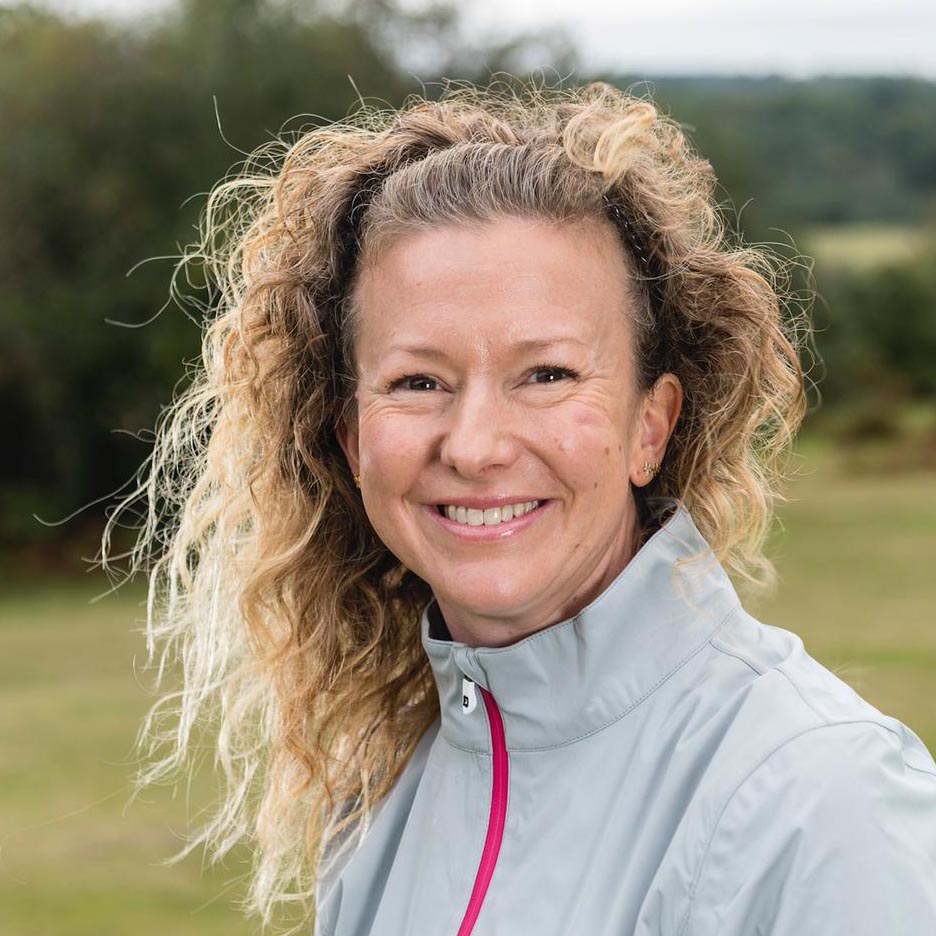
Katie is an Advanced PGA professional with over 20 years of coaching experience. She helps golfers of every age and ability to be the best versions of themselves. In January 2022 she was named as one of Golf Monthly's Top 50 Coaches.
Katie coaches the individual and uses her vast experience in technique, psychology and golf fitness to fix problems in a logical manner that is effective - she makes golf simple. Katie is based in the South of England, on the edge of the New Forest. An experienced club coach, she developed GardenGOLF during lockdown and as well as coaching at Iford Golf Centre, The Caversham- Home of Reading Golf Club and Salisbury & South Wilts Golf Club.
She freelances, operating via pop-up clinics and travelling to clients homes to help them use their space to improve.
She has coached tour pros on both LET tour and the Challenge Tour as well as introduced many a beginner to the game.
Katie has been writing instructional content for magazines for 20 years. Her creative approach to writing is fuelled by her sideline as an artist.
Katie's Current What's In The Bag
Driver: TaylorMade Qi10 9degrees.
Fairway: TaylorMade Qi10 5wood
Hybrid: TaylorMade 4 & 5
Irons: TaylorMade 770 6-AW
Wedges: TaylorMade Tour Grind 4 54 & 58
Putter: TaylorMade Tour X 33"
Favourite Shoes: FootJoy HyperFlex with Tour Flex Pro Softspikes on the course.